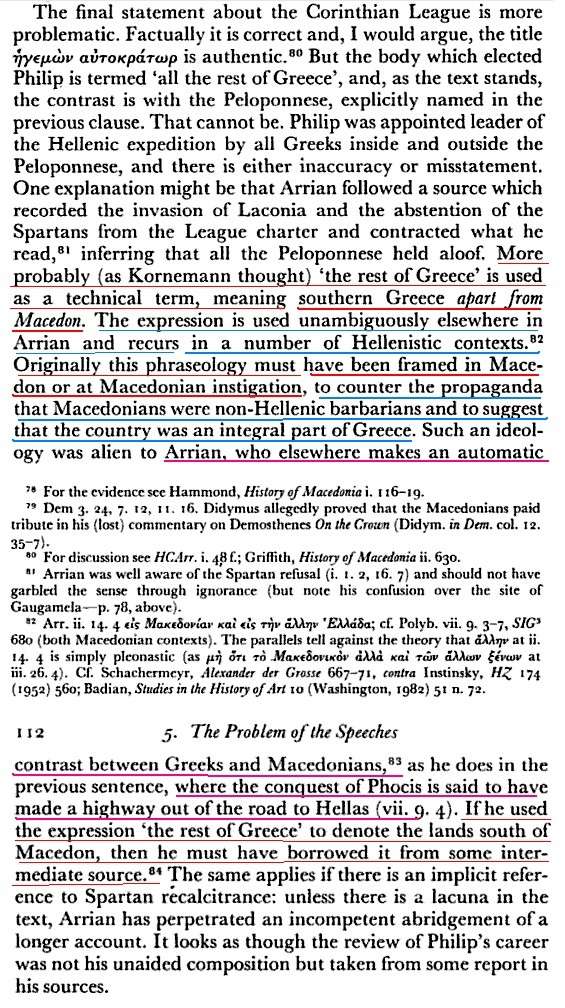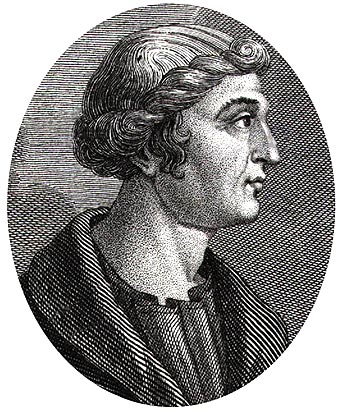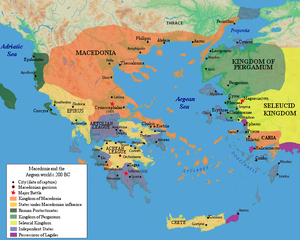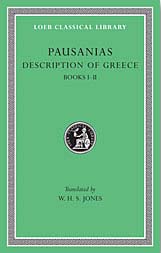Virtual propagandists from Greece are not ashamed to put forth some truncated quotes, trying to pass them as truth. For their needs, they have manufactured a list of certain citations to convince erroneously others with the 'Greekness' of Macedonia.
But let see what is the opinion of one of the most renowned authorities in ancient Macedonia:

From Arrian to Alexander: studies in historical interpretation By A. B. Bosworth
"Macedonians and the rest of Greeks' occurs in several cases into Hellenistic literature. This expression must be classified within the framework of propaganda of Macedonian kings, who aimed to counter the immense propaganda of Greeks about non-Hellenicity of Macedonians. But again they do not have much credibility since they are firmly refuted by dozens of ancient sources, who draw a sharp line between Macedonians and Greeks.
For example, "AMAC" propagandists like to quote Polybius where he has stated "Μακεδονίαν και τήν άλλην Ελλάδα", but cynically they omit to quote Polybius where he has transmitted originally a part of Philip V speech:
“Macedonia and the Rest of Greece” in the ancient Literary & E***raphical sources
Arrian II.14.4: "Macedonia and the rest of Greece" (..Είς Μακεδονίαν και είς την άλλην Ελλάδα)
Polybius 7.9.3: "Macedonia and the rest of Greece" (..Μακεδονίαν και τήν άλλην Ελλάδα)
Strabo, 7.9: "Macedonia, of course, is a part of Greece[..]without taking her [Macedonia] from the rest of Greece" (..έστι μεν ουν Ελλάς και η Μακεδονίαν[...]χωρίς έγνωμεν αυτήν από της άλλης Ελλάδος )
Polybius 7.9.5: "Philip and Macedonians and the rest of Greeks“ (..Φιλίππον και Μακεδόνων και υπό τών άλλων Ελλήνων)
Julius Valerius Alexander Polemios I.18: omni Macedonia et et reliqua Graecia conspirante
Polybius 7.9.7: "Macedonians and the rest of Greeks" (..και Μακεδόνες και των άλλων Ελλήνων)
Plutarch, Alexander's Fortune 99.3.6: "Macedonians and the rest of Greeks" (...Μακεδόνες και οι άλλοι Έλληνες)
Arrian Ι.16.7: "Alexander, son of Philip and the Greeks.." (Αλέξανδρος Φιλίππου και οι Έλληνες )
Strabo, 10.2.23: "to the Macedonians and the rest of Greeks" (...πρός τε τους Μακεδόνας και τους άλλους Έλληνας )
Dio Chrysostom, Discourse on Kingship no. 4; 9 and 48:, Macedonians and the rest of Greeks(...Μακεδόνας τε και τους άλλους Έλληνας )
IG XII,2 525: "...Alexander and the Greeks.." (..καὶ πόλεμον ἐξε[νι]- [κ]άμενος πρὸς Ἀλέξανδρον καὶ τοὶς Ἔλλανας τοὶς μὲν πολίταις παρελόμενος τὰ ὄπλα ἐξε- κλάϊσε) (Eresos 332 BC)
IG X(2.1) no.1031 lines 6-7: "..Macedonians and the rest of Greeks.." (..και τους λοιπούς Μακεδόνας και τους άλλους Έλληνας) (Olympia, Damon the Macedonian, 143 BC)
Syll. 3 nos. 372, lines 6 kai 7: "Kings and the rest of Greeks", (..[υ]πό των βασιλέων και /[τ]ών άλλων Ελλήνων) (Samothrace 288-281 BC)
Magnesia 6, 557, lines 30-31: "of the kings and the rest of Greeks“ (..των βασιλέων [κ]αί των άλλ[ων] Ελλήνων απάν]τωμ) (Magnesia et Maian.: Artemis Leukofryni, 207/6 BC)
Syll.ł 398 590, line 30, "of the kings and the rest of Greeks" (..τοίς βασιλεύσι και τοις άλλοις Έλλησι) (SbBerlin 24 (1905) 979-993, 196 BC)
Ephesos 163: ”..Macedonians and the rest of Greek ethne" (..εἶναι μῆνα καλούμενον παρ̣’ ἡ̣[μ]ῖν μὲν Ἀρτεμισ[ι]-ῶνα, παρὰ δὲ Μακεδόσιν καὶ τοῖς λοιποῖς ἔθνεσιν τοῖς Ἑλληνικοῖς) (Ephesos 160 BC)
Arrian II.14.4: "Macedonia and the rest of Greece" (..Είς Μακεδονίαν και είς την άλλην Ελλάδα)
Polybius 7.9.3: "Macedonia and the rest of Greece" (..Μακεδονίαν και τήν άλλην Ελλάδα)
Strabo, 7.9: "Macedonia, of course, is a part of Greece[..]without taking her [Macedonia] from the rest of Greece" (..έστι μεν ουν Ελλάς και η Μακεδονίαν[...]χωρίς έγνωμεν αυτήν από της άλλης Ελλάδος )
Polybius 7.9.5: "Philip and Macedonians and the rest of Greeks“ (..Φιλίππον και Μακεδόνων και υπό τών άλλων Ελλήνων)
Julius Valerius Alexander Polemios I.18: omni Macedonia et et reliqua Graecia conspirante
Polybius 7.9.7: "Macedonians and the rest of Greeks" (..και Μακεδόνες και των άλλων Ελλήνων)
Plutarch, Alexander's Fortune 99.3.6: "Macedonians and the rest of Greeks" (...Μακεδόνες και οι άλλοι Έλληνες)
Arrian Ι.16.7: "Alexander, son of Philip and the Greeks.." (Αλέξανδρος Φιλίππου και οι Έλληνες )
Strabo, 10.2.23: "to the Macedonians and the rest of Greeks" (...πρός τε τους Μακεδόνας και τους άλλους Έλληνας )
Dio Chrysostom, Discourse on Kingship no. 4; 9 and 48:, Macedonians and the rest of Greeks(...Μακεδόνας τε και τους άλλους Έλληνας )
IG XII,2 525: "...Alexander and the Greeks.." (..καὶ πόλεμον ἐξε[νι]- [κ]άμενος πρὸς Ἀλέξανδρον καὶ τοὶς Ἔλλανας τοὶς μὲν πολίταις παρελόμενος τὰ ὄπλα ἐξε- κλάϊσε) (Eresos 332 BC)
IG X(2.1) no.1031 lines 6-7: "..Macedonians and the rest of Greeks.." (..και τους λοιπούς Μακεδόνας και τους άλλους Έλληνας) (Olympia, Damon the Macedonian, 143 BC)
Syll. 3 nos. 372, lines 6 kai 7: "Kings and the rest of Greeks", (..[υ]πό των βασιλέων και /[τ]ών άλλων Ελλήνων) (Samothrace 288-281 BC)
Magnesia 6, 557, lines 30-31: "of the kings and the rest of Greeks“ (..των βασιλέων [κ]αί των άλλ[ων] Ελλήνων απάν]τωμ) (Magnesia et Maian.: Artemis Leukofryni, 207/6 BC)
Syll.ł 398 590, line 30, "of the kings and the rest of Greeks" (..τοίς βασιλεύσι και τοις άλλοις Έλλησι) (SbBerlin 24 (1905) 979-993, 196 BC)
Ephesos 163: ”..Macedonians and the rest of Greek ethne" (..εἶναι μῆνα καλούμενον παρ̣’ ἡ̣[μ]ῖν μὲν Ἀρτεμισ[ι]-ῶνα, παρὰ δὲ Μακεδόσιν καὶ τοῖς λοιποῖς ἔθνεσιν τοῖς Ἑλληνικοῖς) (Ephesos 160 BC)

From Arrian to Alexander: studies in historical interpretation By A. B. Bosworth
"Macedonians and the rest of Greeks' occurs in several cases into Hellenistic literature. This expression must be classified within the framework of propaganda of Macedonian kings, who aimed to counter the immense propaganda of Greeks about non-Hellenicity of Macedonians. But again they do not have much credibility since they are firmly refuted by dozens of ancient sources, who draw a sharp line between Macedonians and Greeks.
For example, "AMAC" propagandists like to quote Polybius where he has stated "Μακεδονίαν και τήν άλλην Ελλάδα", but cynically they omit to quote Polybius where he has transmitted originally a part of Philip V speech:
POLYBIUS - 'THE RISE OF THE ROMAN EMPIRE', HISTORIES Book XVIII.5
Αἰτωλῶν δ' οὐκ ἀνεκτόν: ποίας δὲ κελεύετέ με" [7] φησὶν " [8] ἐκχωρεῖν Ἑλλάδος καὶ πῶς ἀφορίζετε ταύτην; αὐτῶν γὰρ Αἰτωλῶν οὐκ εἰσὶν Ἕλληνες οἱ πλείους: τὸ γὰρ τῶν Ἀγραῶν ἔθνος καὶ τὸ τῶν Ἀποδωτῶν, ἔτι δὲ τῶν Ἀμφιλόχων, οὐκ ἔστιν Ἑλλάς. [9] ἢ τούτων μὲν παραχωρεῖτέ μοι;"
'What is this Greece which you demand that I should evacuate, and what how do you define Greece?. Certainly most of the Aetolians themselves are not Greeks!. The countries of the Agraae, the Apodotea, and the Amphilochians cannot be regarded as Greeks. So do you allow to me to remain in those territories'
Αἰτωλῶν δ' οὐκ ἀνεκτόν: ποίας δὲ κελεύετέ με" [7] φησὶν " [8] ἐκχωρεῖν Ἑλλάδος καὶ πῶς ἀφορίζετε ταύτην; αὐτῶν γὰρ Αἰτωλῶν οὐκ εἰσὶν Ἕλληνες οἱ πλείους: τὸ γὰρ τῶν Ἀγραῶν ἔθνος καὶ τὸ τῶν Ἀποδωτῶν, ἔτι δὲ τῶν Ἀμφιλόχων, οὐκ ἔστιν Ἑλλάς. [9] ἢ τούτων μὲν παραχωρεῖτέ μοι;"
'What is this Greece which you demand that I should evacuate, and what how do you define Greece?. Certainly most of the Aetolians themselves are not Greeks!. The countries of the Agraae, the Apodotea, and the Amphilochians cannot be regarded as Greeks. So do you allow to me to remain in those territories'










Comment